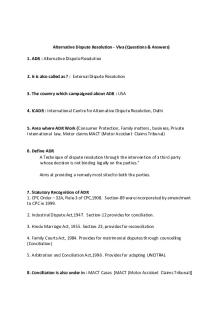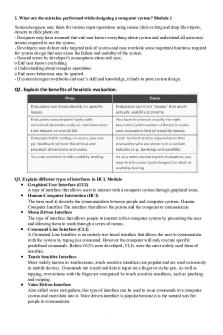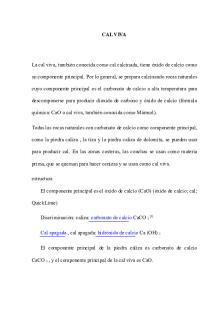Viva Speech - My Submissions inthe case of Siobhan PDF

| Title | Viva Speech - My Submissions inthe case of Siobhan |
|---|---|
| Course | Professional Responsibility and Legal Ethics |
| Institution | Western Sydney University |
| Pages | 4 |
| File Size | 101.7 KB |
| File Type | |
| Total Downloads | 1 |
| Total Views | 163 |
Summary
My Submissions inthe case of Siobhan...
Description
May it please the court, my name is and I appear today for the matter involving the complaints made by the New South Wales Bar Association against Miss Siobahn. The complaints are two fold and will be addressed separately.
The first complaint was made by one, Mr Angelo who claimed that Miss Siobahn had an obligation to represent him and that she failed to do so. This claim is based upon the fact that Siobahn was approached by Angelo asking for legal representation which, following an interview Siobahn she declined. In this situation the “cab-rank” principle would seemingly apply. The cab-rank principle, as dissented in the case of Arthur J S Hall & Co against Simons in 2002 by Lord Hobhouse is considered “a fundamental and essential park of a liberal legal system.” Furthering this, Justice Brennan explained the need of the cab rank principle in Giannarelli against Wraith 1998 where he said “it is unacceptable that the privileges of legal representation should be available only to the predilection of counsel or only on the payment of extravagant fees.” Rule 21 of the New South Wales Barristers’ Rules state that; “A barrister must accept a brief from a solicitor to appear before a court in a field in which the barrister practises or professes to practise if: (a) the brief is within the barrister’s capacity, skill and experience; (b) the barrister would be available to work as a barrister when the brief would require the barrister to appear or to prepare, and the barrister is not already committed to other professional or personal engagements which may, as a real possibility, prevent the barrister from being able to advance a client’s interests to the best of the barrister’s skill and diligence; (c) the fee offered on the brief is acceptable to the barrister; and (d) the barrister is not obliged or permitted to refuse the brief under Rules 95, 97, 98 or 99”
There in lies the crux of the issue. While it is important that barristers accept a brief in any court they practise in Rule 99 (a) states that a barrister may refuse or return a brief to appear before a court if the brief is not offered by a solicitor. Applying that to this case, Mr Angelo is not a solicitor so therefore, I submit that Miss Siobahn had no legal obligation to represent Mr Angelo.
Your honour, I would now like to turn the courts attention to the second complaint against Miss Siobahn made by one Mr Wasim. Mr Wasim claims that Miss Siobahn breached her contract with him when she did not attend the call-over on his behalf. Miss Siobahn claims that she had no legal obligation to him as they had only discussed the ‘possibilities of legal representation.’ However a cost agreement had been drafted, implying that there was to be definite fiduciary relationship between Siobahn and Wasim. In the case of Freeman & Lockyer against Buckhurst Park Properties Limited in 1964, Justice Diplock dissented that; “An "apparent" or "ostensible" authority, (as opposed to actual authority), is a legal relationship between the principal and the contractor created by a representation, made by the principal to the contractor, intended to be and in fact acted upon by the contractor, that the agent has authority to enter on behalf of the principal into a contract of a kind within the scope of the "apparent" authority, so as to render the principal liable to perform any obligations imposed upon him by such contract” Likewise, in this case, Miss Siobahn should have attended the call-over on his behalf as there was a clear consensus ad idem between the two parties when drafting the cost agreement, even it it was not finalised. The question remains; did Miss Siobahn breach her contract with Mr Wasim by failing to attend the call-over on his behalf. Under section 497 (a) of the Legal Profession Act 2004, Professional Misconduct is defined as “unsatisfactory professional conduct of an Australian legal practitioner, where the conduct involves a substantial or consistent failure to reach or maintain a reasonable
standard of competence and diligence.” Miss Siobahn’s conduct, or lack thereof, by failing to attend the call-over shows an unsatisfactory professional conduct at a degree higher than mere carelessness or mere negligence which is grounds for disciplinary action in accordance with the courts and Administrative Decisions Tribunal. However as found in the case of A Legal Practitioner v Law Society of Tasmania in 2005, neglect in relation to the one client held not of a sufficient degree to amount to professional misconduct. The practitioner was formally cautioned to ensure that a client’s instructions are faithfully followed and that any uncertainty about them is resolved in putting them into effect, the practitioner was further cautioned that the Rules of Practice should be strictly adhered to and finally the practitioner was required to make a fulsome apology to the complainant and her immediate family for the errors which occurred. In light of the comparable similarity in severeness of the cases, I submit that the same consequential determination be required of Miss Siobahn
Your Honor, I would like to turn your attention to the case of Travel Air international Proprietary Limited against Raymond Bastion, 2012. In this case, a solicitor by the name of Mr Kells appeared on behalf of Travel Air International and Ms Chandersheka. During the case, a mishap occurred where Mr Kells’ hearing aid became defective and he settled the case without the consent of the plaintiffs. After a notice of motion to set aside the judgment was heard, his Honour Magistrate Williams dissented that “I am satisfied on the authorities that the applicant's solicitor had ostensible authority to compromise the claim and that as in Presrod (above) there was nothing in the way the case proceeded or the manner in which the settlement discussions took place, that would affect the respondent's solicitor from relying on that ostensible authority. In fact to the contrary, the parties left the court room-with the express purpose of considering a compromise, a compromise was discussed between the solicitors for the applicant and the respondent in the
presence of the applicants, and following those discussions the applicants and their solicitor re-entered the court together and their solicitor announced the settlement to the Court. I am also of the view that, if in fact the applicants had not given express authority to their solicitor to settle the claim, that would not render the judgment irregular, illegal or against good faith.”! The key difference in this case, when compared to that involving Miss Siobahn and Mr Wasim, Mr Kells mistake, while still having some impact, did not effect the overall outcome of the case however Miss Siobahn’s failure to attend the call-over did.
In conclusion, your honour, pertaining to the the first complaint, Miss Siobahn had no legal obligation to Angelo on the basis of the New South Wales Barristers’ Rules, rule 99 section a. However in regards to Mr Wasim’s complaint, she did owe a fiduciary duty of care to him to attend the call-over.
That concludes my submissions....
Similar Free PDFs

My graduation speech
- 3 Pages

In My Bag Speech Outline
- 1 Pages

Case list - Viva voce case list
- 3 Pages

Homage to my Hips Speech
- 3 Pages

Submissions Longreads
- 4 Pages

ADR Viva QS - ADR VIVA
- 7 Pages

Types of Speech & Speech Outline
- 4 Pages

HMI VIVA - HMI Viva Peparation
- 9 Pages

Music Quiz Submissions
- 6 Pages

Quiz Submissions 4
- 2 Pages

OSPF Quiz Submissions 2
- 22 Pages

CAL VIVA - Resumen sobre cal viva
- 14 Pages

7 - weekly submissions , week 5
- 2 Pages
Popular Institutions
- Tinajero National High School - Annex
- Politeknik Caltex Riau
- Yokohama City University
- SGT University
- University of Al-Qadisiyah
- Divine Word College of Vigan
- Techniek College Rotterdam
- Universidade de Santiago
- Universiti Teknologi MARA Cawangan Johor Kampus Pasir Gudang
- Poltekkes Kemenkes Yogyakarta
- Baguio City National High School
- Colegio san marcos
- preparatoria uno
- Centro de Bachillerato Tecnológico Industrial y de Servicios No. 107
- Dalian Maritime University
- Quang Trung Secondary School
- Colegio Tecnológico en Informática
- Corporación Regional de Educación Superior
- Grupo CEDVA
- Dar Al Uloom University
- Centro de Estudios Preuniversitarios de la Universidad Nacional de Ingeniería
- 上智大学
- Aakash International School, Nuna Majara
- San Felipe Neri Catholic School
- Kang Chiao International School - New Taipei City
- Misamis Occidental National High School
- Institución Educativa Escuela Normal Juan Ladrilleros
- Kolehiyo ng Pantukan
- Batanes State College
- Instituto Continental
- Sekolah Menengah Kejuruan Kesehatan Kaltara (Tarakan)
- Colegio de La Inmaculada Concepcion - Cebu


